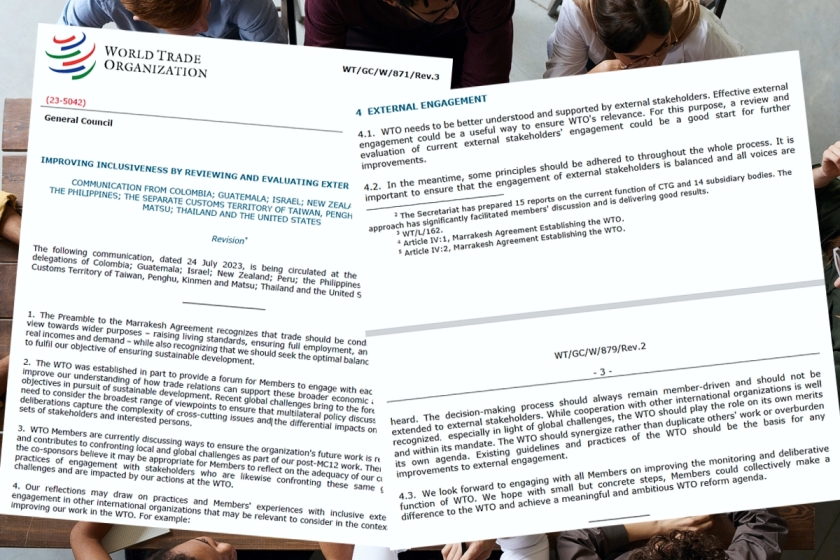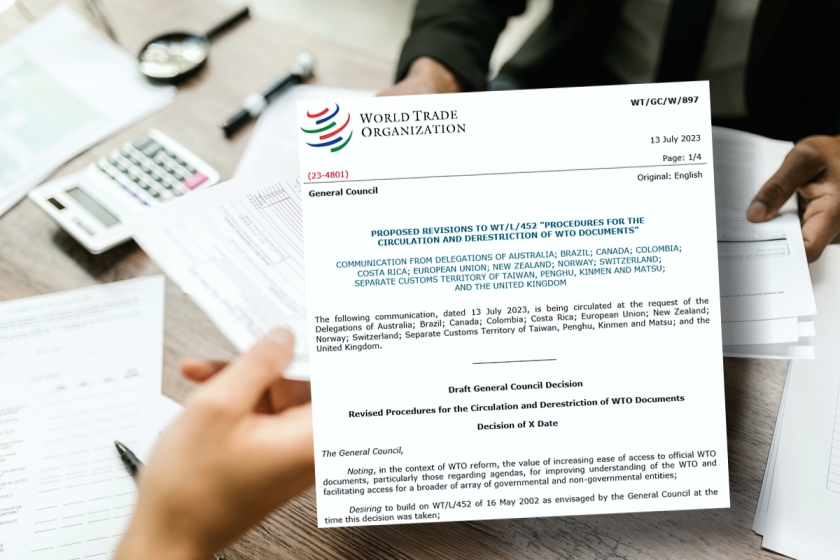By Peter Ungphakorn
POSTED JULY 31, 2023 | UPDATED DECEMBER 15, 2023
The last General Council meeting before the 2023 summer break at the World Trade Organization (WTO), on July 24 and 25, received several documents on WTO reform. Some of them deal with public information and transparency — including making more documents available to the public, and quicker — and deserve more attention.
(Jump to the section on the proposal about derestricting documents, including the full text)
Why is this important? Here’s an example.
One of the most recent developments in the WTO is agreement on an almost-final text among participants negotiating new rules on investment. The deal would streamline investment procedures for the benefit of developing countries — Investment Facilitation for Development.
Ask anyone involved or with privileged information and they will speak glowingly about how useful this is going to be, such as in this session of the WTO Public Forum on September 15, 2023, or this article by ex-WTO Deputy Director-General Alan Wolff.
But the world at large has to take their word for it because the text is still secret. Ask “Why is it secret?” and the answer is “because it’s not completely final”.
The world at large has to take their word for it because the text is still secret
And yet the biggest task of all for this group of like-minded participants is to persuade other members to join in, or at least not to block the deal. That’s what they are about to try over the coming months. Among the countries they will have to persuade are India, South Africa and the US.
To muster support for this or any other deal, governments have to win over various groups inside their countries. To use the jargon, they must engage with their stakeholders. And that means sharing information with them and probably with the public as a whole. Keeping the text secret does the opposite.
Oh, and by the way, the Investment Facilitation draft has been leaked — as often happens with 164 WTO delegations and hundreds of people involved.
Leaking is not a satisfactory solution. It’s selective and therefore biased. And it defeats the purpose of keeping texts confidential. They might as well just release the texts.
Continue reading or jump to:
Engaging with stakeholders | Derestricting documents | The proposal’s text

![]()
Transparency in WHO talks
Negotiating agreements is not a major part of the World Health Organization’s work. Its Health Assembly has only ever agreed on one, the 2003 Framework Convention on Tobacco Control.
In December 2021 an Intergovernmental Negotiating Body (INB) was created to negotiate a new “WHO convention, agreement, or other international instrument on pandemic prevention, preparedness and response” (“WHO CA+”) and related rules and regulations.
The talks’ secretariat (the INB Bureau) has published all drafts. It circulated the latest draft text on May 22, 2023. Two weeks later the text was available publicly, with a briefing for members and stakeholders a few days later. The WHO website says:
“In the spirit of continued transparency in the work of the INB, [the draft] was published online on 2 June 2023 in all WHO official languages. Relevant stakeholders had an opportunity to take part in a dedicated briefing held on 5 June 2023 together with Member States.”
Engaging with stakeholders
Two papers in the July 2023 General Council meeting discuss working with stakeholders.
One, from Australia, China and Thailand, is called “Small Steps to Make a Difference” and was first issued by China alone in May 2023, the other two signing on in May and June. It includes a section on “External Engagement”, which begins:
“[The] WTO needs to be better understood and supported by external stakeholders. Effective external engagement could be a useful way to ensure [the] WTO’s relevance. For this purpose, a review and evaluation of current external stakeholders’ engagement could be a good start for further improvements.”
Another from nine members deals specifically with “Improving Inclusiveness by Reviewing and Evaluating External Engagement”. It observes that the WTO is not as good as other international organisations in engaging with interested groups and calls for a review of how to improve this:
“Despite success in some areas, opportunities for sustained multi-stakeholder engagement at the WTO and within WTO Committees appear to significantly lag global best practice as established by other international organizations, international financial institutions, and development assistance providers.”
In the past, members have stressed that the main responsibility for working with interest groups lies with their own governments, not the WTO.
This paper speaks of “members’ experiences with inclusive external engagement in other international organizations”. It is not so clear about the distinction between what members do themselves at home, and what the international organisations do with or without the members.
The paper was first issued in April 2023. By July its sponsors were: Colombia, Guatemala, Israel, New Zealand, Peru, the Philippines, Taiwan, Thailand and the US.
A month before that (on June 21), WTO Director-General Ngozi Okonjo-Iweala announced she had set up two advisory groups, comprising business and civil society leaders.
But not all businesses agree with their international leaders. Nor do all civil society groups. And there’s an overlap in WTO issues such as agriculture. Farmers’ groups can be both “business” and “civil society”.
Groups outside the WTO cannot respond if they don’t know what’s in the proposal
Engaging with groups outside the WTO is only possible if they have the information. They cannot respond if they don’t know what’s in the proposed Investment Facilitation Agreement, or what’s being negotiated on fisheries subsidies that contribute to over-fishing, or what members are discussing on reforming dispute settlement, or anything else they’re supposed to be advising on. None of these are available to the public.
Officials’ instinct is not to talk to the public.
Sometimes confidentiality really is needed. But eventually secrecy becomes counterproductive because it arouses suspicion and erodes support.
On the other hand, there is little or no evidence that openness hampers progress in the WTO. When the WTO agriculture negotiations broke down in 2008 or part of the fisheries subsidies agreement had to be set aside in 2022, there was no evidence that releasing earlier drafts of the texts had anything to do with the deadlock.
There are two ways to give stakeholders information so they can engage properly: leaking it to them selectively, or making it widely available to the public.
Governments regularly leak to selected groups — usually under non-disclosure agreements. This leads to accusations of bias because it’s usually the most powerful lobbies that are favoured.

Derestricting WTO documents
One new proposal aims to make the WTO more open by increasing the information that is immediately available to everyone. Its focus is on derestricting WTO documents.
Its sponsors are Australia, Brazil, Canada, Colombia, Costa Rica, the EU, New Zealand, Norway, Switzerland, Taiwan and the UK.
In the July 2023 General Council meeting, the US said it would add its name. This was confirmed in a revised paper in November circulated before the final General Council meeting of the year. That brought the total to 39 members (counting the EU as 28).
Crucially, the proposal does not deal with negotiated draft agreements. Nor does it end the practice of keeping some unofficial documents secret forever. (These are restricted documents in the series “JOB”, and“RD” for “room documents”, which escape the standard derestriction rule for more formal WTO documents.)
But it does come close to a set of proposals in an article co-authored with Robert Wolfe two years ago.
The new document proposes that many other important documents are released to the public immediately, or faster than at present.
![]()
We see no compelling reason why these must be kept restricted as they are formal statements explaining the state of our work
— the proposal’s sponsors
They include meeting agendas and notes added to the agenda headings, a wide range of reports by the WTO Secretariat, and documents that members want to be released related to their own individual commitments (known as “schedules” of commitments) to open up their markets.
Also targeted are reports to formal meetings by chairs of committees and negotiating groups and by the director-general, which in any case end up in the public domain in the meetings’ minutes.
“We see no compelling reason why these must be kept restricted as they are formal statements explaining the state of our work,” the proposal’s sponsors say.
Some parts of the WTO website that are currently only visible to members’ officials should also be made public, the paper proposes.
“A lot of anodyne but potentially useful information on e-commerce, for example, is hidden when not signed in as a member,” it says.
It also calls for minutes to be released to the public more quickly.
Sources say the proposal was simply presented in the July 24–25, 2023, General Council meeting as one of many under “WTO reform”. There was no discussion.
THE PROPOSAL’S TEXT
The proposal in its official form is here. It starts with a few opening paragraphs, but its main content would revise the present rules on derestricting documents, WT/L/452 from May 2002.
In the document, the proposed revisions are images (screenshots) of tracked changes and comments.
Below, the whole proposal is presented in text, with some editorial explanations in square brackets and italics. (Note the US added is name to the proposal in an otherwise identical revision dated November 23, 2023.)
PROPOSED REVISIONS TO WT/L/452 “PROCEDURES FOR THE CIRCULATION AND DERESTRICTION OF WTO DOCUMENTS”
COMMUNICATION FROM DELEGATIONS OF AUSTRALIA; BRAZIL; CANADA; COLOMBIA; COSTA RICA; EUROPEAN UNION; NEW ZEALAND; NORWAY; SWITZERLAND; SEPARATE CUSTOMS TERRITORY OF TAIWAN, PENGHU, KINMEN AND MATSU; AND THE UNITED KINGDOM
The following communication, dated 13 July 2023, is being circulated at the request of the Delegations of Australia; Brazil; Canada; Colombia; Costa Rica; European Union; New Zealand; Norway; Switzerland; Separate Customs Territory of Taiwan, Penghu, Kinmen and Matsu; and the United Kingdom.
Draft General Council Decision
Revised Procedures for the Circulation and Derestriction of WTO Documents
Decision of X Date
The General Council,
Noting, in the context of WTO reform, the value of increasing ease of access to official WTO documents, particularly those regarding agendas, for improving understanding of the WTO and facilitating access for a broader of array of governmental and non-governmental entities;
Desiring to build on WT/L/452 of 16 May 2002 as envisaged by the General Council at the time this decision was taken;
Further ensuring that WTO documents will be publicly available, except in limited circumstances;
Decides to amend/revise WT/L/452 as follows:
World Trade
Organization
WT/L/452
16 May 2002
(02-2719)
| PROCEDURES FOR THE CIRCULATION AND DERESTRICTION OF WTO DOCUMENTS Decision of 14 May 2002 | |
| The General Council, Having regard to Articles IV:1, IV:2 and IX:1 of the Marrakesh Agreement Establishing the World Trade Organization, Considering that there is a need to improve the current Procedures for the Circulation and Derestriction of WTO documents, Emphasizing the importance of greater transparency in the functioning of the WTO, Decides as follows: | |
| 1. All official WTO documents1 shall be unrestricted. [ADDED]In addition, the following unofficial documents shall be unrestricted: annotated agendas and reports to formal meetings by chairs of regular bodies and bodies in special session [ie, negotiations], by the chair of the TNC, and by the Director General.[END OF ADDITION] 1 For the purposes of this Decision, an official WTO document shall be any document submitted by a Member or prepared by the Secretariat to be issued in any one of the following WTO document series: [ADDED] WTO/AIR series, ICN series; [END OF ADDITION] WT‑series (including reports of panels and the Appellate Body); G-series (except G/IT-series); S-series; IP‑series; GATS/EL-series; GATS/SC-series; the Schedules of Concessions and TN-series. Where a new WTO document series is created, the relevant WTO body shall decide on the derestriction procedures applicable to that series, taking into account the present decision. | Comment [A1]: Addition in red to the footnote to ensure that documents relating to agendas or meeting organization are unrestricted Comment [A2]: We see no compelling reason why these must be kept restricted as they are formal statements explaining the state of our work. [Editor’s note: the WTO/AIR series is mainly draft meeting agendas but also contains other information; the ICN series is informal meeting convening notices.] |
| 2. Notwithstanding the provisions of paragraph 1, | |
| (a) any Member may submit a document as restricted, which shall be automatically derestricted after its first consideration by the relevant body or 60 days after the date of circulation, whichever is earlier, unless requested otherwise by that Member.2 In the latter case, the document may remain restricted for further periods of 30 days, subject to renewed requests by that Member within each 30-day period. The Secretariat shall remind Members of such deadlines, and derestrict the document upon receipt of a written instruction. Any document may be derestricted at any time during the restriction period at the request of the Member concerned. 2 However, any document that contains only information that is publicly available or information that is required to be published under any agreement in Annex 1, 2 or 3 of the WTO Agreement shall be unrestricted [ADDED] whether formal or informal [END OF ADDITION]. | Comment [A3]: The change in the footnote is for further clarity. There’s a risk that a JOB document containing only factual materials could end up restricted, which we would not want to have happen |
| [DELETED] | Comment [A4]: We see no reason why official documents prepared by the Secretariat in the series covered by point 1 should ever be restricted. |
| (c) minutes of meetings (including records, reports and notes) shall be restricted and shall be automatically derestricted [ADDED]30[END OF ADDITION] [DELETED] 3 It is understood that, normally, minutes (including records, reports and notes) of meetings shall be circulated within three weeks after a meeting of a WTO body and not later than the notice convening the following meeting of that body. Pursuant to Section C, paragraph (vi) of the Trade Policy Review Mechanism contained in Annex 3 of the WTO Agreement, minutes of the Trade Policy Review Body shall continue to be circulated as unrestricted. | Comment [A5]: 30 days should be sufficient [Editor’s note: the proposal is to derestrict minutes 30 days after circulation to members instead of 45 days. Note the period for circulation in the footnote is unchanged.] |
| (d) documents relating to modification or renegotiation of concessions or to specific commitments pursuant to Article XXVIII of the GATT 1994 or Article XXI of the GATS respectively shall be restricted [ADDED] except where a Member submitting such a document requests that it be unrestricted [END OF ADDITION] and automatically derestricted upon certification of such changes in the schedules; | Comment [A6]: Following the principle that a Member can always decide to allow its own document to be unrestricted. |
| (e) documents relating to working parties on accession shall be restricted and shall be automatically derestricted upon the adoption of the report of the working party. | |
| 3. Translation of official WTO documents in all three official WTO languages (English, French and Spanish) shall be completed expeditiously. Once translated in all three official WTO languages, all official WTO documents that are not restricted shall be made available via the WTO web-site to facilitate their dissemination to the public at large.4 4 Notwithstanding paragraph 3, any document that contains information that is publicly available or information required to be published under any agreement in Annex 1, 2 or 3 of the WTO Agreement shall continue to be made available via the WTO web-site immediately in the original WTO language in which it is written. | |
| 4. The Decision of the General Council of 18 July 1996 on Procedures for the Circulation and Derestriction of WTO documents, as contained in WT/L/160/Rev.1, [ADDED] and the Decision of the General Council of 16 May 2002 on Procedures for the Circulation and Derestriction of WTO documents as contained in WT/L/452 [END OF ADDTION] shall be abrogated as of the date of adoption of the present decision, [DELETED] | Comment [A7]: [on the deletion] We see no need for multiple regimes applying depending on the age of a document. In practice we expect this will have only modest impact |
| [ADDED] 5. Information contained on the WTO website shall be unrestricted and accessible to the general public unless it is practical information for members, such as phone numbers of Secretariat staff, that the Secretariat deems is best reserved for use by Members only, or it is otherwise restricted pursuant to the present decision or any other relevant decisions [END OF ADDITION] | Comment [A8]: A lot of anodyne but potentially useful information on e-commerce, for example, is hidden when not signed in as a member. Comment [A9]: This decision does not apply to documents on government procurement, for example |
| 6. In the light of the experience gained from the operation of these procedures and changes in any other relevant procedures under the WTO, the General Council will, at an appropriate time, review and if necessary modify the procedures. |
Updates:
December 12, 2023 — adding the US joining, in the November 23 revision
September 16, 2023 — adding the reference and link to the September 15 WTO Public Forum session
August 19, 2023 — adding the box on transparency in WHO negotiations
August 17, 2023 — adding the link to Alan Wolff’s PIIE article
Image credits:
Handing over documents (featured image and background of composite image) | RDNE Stock Project, Pexels licence
Meeting (background of composite image) | Fauxels, Pexels licence




